- Home
- Jana Petken
The Guardian of Secrets and Her Deathly Pact Page 55
The Guardian of Secrets and Her Deathly Pact Read online
Page 55
“It’ll take us two or three minutes. Don’t you worry – I can do this run backwards and blindfolded. But he’ll probably be dead by the time we get there in any case; you do know that?”
“Shut up!” Pedro told the driver without taking his eyes off Hans for a second. “If he dies, I’ll kill you just for saying that.” Pedro knew that the driver was probably right, but later, when Hans had been deposited, he sat outside one of the tents where life-and-death operations took place, holding his head in his hands and praying for a miracle.
An hour passed. A good sign, Pedro thought, a sign that the operation had gone well and that Hans was still alive. They would have told him by now if he’d died on the table, wouldn’t they?
“Excuse me, soldier, are you with the German man?” Pedro heard a familiar voice ask.
“Yes, I am.” He didn’t lift his head, instead thinking that war plays all sorts of tricks on the mind. Once, in Madrid, he convinced himself that a woman getting into an ambulance at one of the dressing stations was his Lucia, and now he was hearing his sister’s voice.
He looked up into the face belonging to the voice, and she stood frozen in front of his eyes.
“María?” he still questioned.
She nodded, unable to speak.
“My God, it is you. It really is you!”
“Yes, it’s me, Pedro.”
Pedro crushed her to him, and they cried, clinging to each other, unwilling to lose the tender moment.
“Pedro, I’ve dreamed of this, dreamed and dreaded it at the same time. Thank God you’re alive,” María said, still sobbing.
Pedro pushed her gently away and wiped his wet eyes on his sleeve. His little sister was not two feet away from him; it was a miracle. “María …”
“Not now, brother. Come with me. Your friend is asking for you.”
Pedro involuntary sucked in his breath, retching at the smell of blood, urine, iodine, vomit, and the furtive odour of the dead. This was even more prolific than on the battlefield, he thought. How could anyone work in this place? He followed María through the lines of injured men. Some were lying on trolleys and others on the floor. There was a maze of tents, each one connected, filled to the brim with bloodied men and too few medical staff. As they moved forward towards the last tent, Pedro noticed that in this area, the injuries were more severe.
“María, I am so proud of you,” he whispered to her.
“Me, a nurse, eh,” she said with a smile. “The operating theatre is in the next tent. He’s waiting for you.”
María told Pedro to stay where he was for a moment, and then she disappeared beneath the flap of the last tent.
Pedro thought again about the job his sister was doing. She had taken him by surprise, not just because she was there but because of her ability to endure a job that would even turn the strongest of male stomachs. María, who loved all living creatures, from ants to wild boars hunted in winter, was surrounded by death in a place far from her peaceful world at La Glorieta. Life was full of surprises, and some of them were even pleasant ones.
“Englishman,” Hans whispered from the trolley. His neck was bandaged, and a dressing had been placed over the stomach wound. His chest rose and fell in shallow gasps, and Pedro knew at once by the defeated expression on the surgeon’s face that his friend wouldn’t make it.
“I wish I hadn’t smelled that coffee,” Hans said, his voice barely audible.
“Don’t speak. Save your strength,” Pedro heard himself say unconvincingly.
“I’m dead already, Englishman. I just wanted to see your ugly face before I closed my eyes, and I wanted to tell you to get Hitler, Mussolini, Franco, and all the other fascist bastards. Promise me?”
“I promise, Hans. I’ll get them all, and then I’ll come visit you in Germany and you can buy me a jug of your best beer.”
“I would have liked that. Stay safe, Peter. Make sure you survive this, for both of us …”
Pedro waited for his friend to speak again, but instead he closed his eyes, leaving his mouth open and unspoken words on his lips.
Pedro had seen plenty of dead men, women, and children along the way, but this dead man was his best friend, his confidante, and his mentor. Hans had breathed real passion into him, and the solid convictions he felt now had stemmed from Hans’s philosophy. What was the point of it all if men like him died? Who would be left to pick up the pieces when the war was all over? Hans was a man who could never be replaced, and the world had suffered a great loss. Men like him were rare.
“María?”
“It’s over for him, Pedro. Come outside for some fresh air,” María told him.
Outside in the dark, Pedro clung to her and sobbed quietly, and María held him until he was ready to speak.
“María, this is the happiest and most miserable night I can ever remember. Hans brought me to you, and now he’s gone. I wish you had known him. You would have liked him,” he said.
She nodded sadly and then said, “Pedro, do you see that tent, two down from here?”
“Yes, why?” Pedro asked.
“There’s someone in there who would like to talk to you.”
“Talk to me? Who is it?”
“You’ll see. Just go. I’ll wait here for you.” María smiled.
Pedro walked towards the tent pointed out to him and lifted the flap. Inside, the tent was lit by candlelight which cast shadows against the canvas, giving the place an eerie, almost supernatural atmosphere. Men lay on makeshift beds whilst nurses shuffled efficiently and silently around the room deep in concentration, unaware of Pedro’s presence.
Pedro settled his gaze on the face of one of the nurses who was bending over a patient: Lucia! His mouth opened, but he didn’t speak. She looked tired, thinner, and very pale. Was she ill? He panicked. She smiled at the man she was attending to, and her bright sparkling eyes, the vision that he had faithfully carried in his mind for months, were exactly the same. He sighed with relief but couldn’t bring himself to break his silence. Instead, he watched her, drinking in the sight of her adorable face, greedily imprinting it in his mind before it was lost to him again.
Neither moved nor spoke when Lucia looked up and, for no apparent reason, directed her eyes at Pedro. They devoured each other from opposite sides of the tent. Their eyes told the story of two people desperately in love and overwhelmed with joy until finally the spell was broken. Lucia ran to him, speaking his name repeatedly. He kissed her and swung her body around in his arms, causing even more of a stir. Unaware of their surroundings, they heard and saw only each other in that moment. There were no patients, no war; there was only love.
Pedro stared again at Lucia, took her by the hand, and led her outside. He had imagined this moment in his mind’s eye as far back as the campaign in Spanish Morocco. In his mind, he had seen her in many different places, but his sweet imaginings were always halted abruptly by reality and truth. For him, the reality was that the women he saw in ambulances, in route marches, towns, and dressing stations could not possibly be Lucia, for she was in Valencia. They only resembled her in some way. To see two of the women who meant more to him than life itself here in a battle zone some four hundred kilometres from home was too much for him to take in. He cried, releasing all the sadness and guilt that the war had brought him. Lucia stroked his head, pushing her fingers through his matted curls. She held him and told him that she loved him repeatedly – until he looked into her eyes and kissed her into silence.
María joined them later. They sat together huddled behind a crumbling stone wall, drinking coffee and talking about everything they could think of before Pedro had to leave for the front again.
María began to feel anxious. She had warned Lucia that her family thought it best not to tell Pedro about Marta’s death. Although at the time she had not agreed with this decision, she knew now that she couldn’t bring herself to tell him. Her parents had probably been right all along. She looked at his war-wearied face; he had lost his friend o
nly five minutes earlier. She would not be guilty of making his burdens even heavier than they already were:
“Yes, Mama and Papa are doing fine,” she told him for the third time.
Pedro said worriedly, “I’ve heard that monasteries and convents have been burned and that priests have been murdered in some republican zones. I’m worried about Marta. I will feel a lot better when she gets out of that damn place and into a safe zone.”
“She is safe at the moment, Pedro, more at peace than you or me,” María lied, but with a certain amount of hidden truth.
“Yes, well, I still think arrangements should be made. It’s only a matter of time before revenge rears its ugly head at her convent … Someone should get her now.”
Pedro lay down in the corner of the trench and closed his eyes. He was exhausted and happy but also filled with a sadness he had never known. Lying there, he couldn’t help but wonder if fate was predetermined, as his mother had always maintained. Was it? Or was it simply a fact that in the crazy madness of the world they lived in, wonderful coincidences came about to make people believe in the divine power of miracles. Faith and hope were what kept most human beings from giving up entirely. He sighed, relaxing his body’s heavy muscles, and thought again about Hans. The tiny corner in the hole he had shared with him was now empty and cold, yet he could still hear Hans’s voice talking about his family and Germany. He could still remember Hans’s plans, his dreams, and his desire to raise a family free of oppression after the defeat of fascism. Tears converged on his eyelids, and he wiped them away with mud-stained fingers, then covering his face with his hands. He cried a while longer, this time with joy. He had seen his love and his sister and felt as though his loneliness had been washed away. He did believe in miracles and would continue to believe in them!
Pedro heard Harry Miller’s heavy unbalanced stride. He kept his eyes closed and thought about La Glorieta, where the only sound was that of birds at sunrise. He concentrated on that sound, hoping against hope that Harry Miller would pass him by and leave him alone.
“Peter, fancy a cup of coffee?” he heard Miller ask. “I’ve brought one for you.”
“No,” Pedro told him.
“Where’s your German friend? Hans, isn’t it? I brought one for him too,” Joseph insisted.
“Not now, Miller. I’m trying to sleep.” Just his luck, Pedro thought. Harry Miller was the last person he wanted to see. Jesus, the man wouldn’t leave him alone. If it wasn’t a game of cards he wanted, it was answers to nosy and unwanted questions about his family.
Pedro opened his eyes, unable to ignore the presence any longer. “I said not now! We’re moving out in a couple of hours. Go and get some sleep and give me a bit of peace, for Christ’s sake.”
Joseph stooped low testing the ground with his feet in the darkness and then joined Pedro in the trench.He sat down, gulped one mug of coffee down in one, and shook his head.
“Touchy, touchy, touchy!” he half sang, half spoke. “That’s no way to treat a comrade in arms, now is it? Not very grateful either, not after I’ve risked my life to get you the fucking coffee in the first place. So I’ll drink it. Can’t let it go to waste, can we?”
Joseph lifted the second mug and tilted it towards his mouth, raised his head upwards, and let the last drop of coffee drip on to his tongue. Afterwards, he said, “Did your mother never teach you not to waste anything?”
No response.
“No, I bet she didn’t. You probably had everything you wanted growing up, probably too much. If I was a betting man, I’d say you were you were a spoilt rich brat given whatever your heart desired.... Am I right, Peter? I bet you grew up with a load of fucking servants doing your bidding. Your mother was like that, liked the grand life, and from what I hear, still does.”
Pedro bolted upright and stared into the shifty eyes staring back at him. Miller spoke about his mother as if he knew her, had met her. Then he realised that he was always asking about his family, always digging for information about them. Fear gripped him. Something about Harry Miller had bothered him right from the first time they’d met. Miller was a puzzle. He was a man who didn’t make friends easily, was disliked for his crudeness, yet he hadn’t left him alone since Madrid and couldn’t do enough for him. He had never been comfortable in Miller’s company. Hans had hated him, and Hans was a good judge of character. Miller’s face was familiar too, he thought. Looking at Joseph for the first time, it was as though he knew him, had some connection with him, though he’d never said as much to Hans. He would have thought him crazy.
“What’s with the questions, Miller? Why are you talking about my mother?” Pedro asked.
“Ah, so the pin’s dropping?”
Pedro stared stupidly at Joseph. The pin’s dropping? Was he supposed to know this man? Did he know his mother?
“What are you talking about? What pin?”
“The fucking pin that’s dropping on your thick skull!” Joseph said sarcastically.
“Miller, just tell me what you want from me and then get lost, will you? I’m not in the mood for puzzles.” Pedro lay back down again, loath to hear anything else.
“Take a good look at my face boy, a really close look. What do you see?” Joseph said, clearly unwilling to be dismissed.
“I see an old man with too much time on his hands. I see a nosy bastard who has no business talking about my family. I see a pain in the arse that’s going to make me forget my generally good nature. That’s what I see!”
Pedro breathed heavily; he was tired, grieving, and afraid. He held the man’s staring bloodshot eyes with his own, hoping that he had said enough to end the conversation.
Joseph laughed, demeaning, cynical, and infuriating. His bad breath forced Pedro to look away.
“You really don’t know, do you, boy? You can’t see what’s plain on both our faces,” Joseph eventually said with a lopsided grin.
Pedro sat up again. Warning bells rang in his head. He fumbled for answers, but none came. He stared at Joseph again. “Who are you?” he asked with a sense of foreboding that made his stomach churn.
Joseph laughed again moved closer to Pedro, stretched out his legs comfortably, and sighed with the satisfaction of someone who’d just beaten the odds and won all the money.
“Peter, Peter, Peter. A name that has haunted me for years.” He sighed again. “I knew a Peter once. Did I tell you that? Peter, Peter, Peter … He was like my father, only in-law … Pin dropping now?”
Pedro held his breath. The pin was dropping, but until the words were spoken, he wouldn’t believe them, couldn’t believe them. It was impossible!
Joseph grew serious and leaned in closer again, almost touching Pedros face with his own. “And I did know your mother … That’s right, don’t look so shocked. I knew her, married her, fucked her, and you’re the result … Say hello to your father.” He held out his hand. “Name’s Joseph Dobbs.”
Pedro could barely breathe, and when he did, it was in short sharp breaths, causing the dirt-filled trench to spin in front of him. Joseph Dobbs! The filthy, toothless, wrinkled man in front of him was Joseph Dobbs, his father! He wanted to breathe properly so that he could think straight. Kill Dobbs. Take off his belt and whip his back with it, just like Dobbs had done to his mother. He wanted to bang the murdering bastard’s head into the dirt and to smother him with it, shove it down his throat until he had no breath left in him! If only he could breathe, think! He wanted …
“I know what you’re thinking, Peter. You’re thinking that I’m not quite what you expected. Did you never wonder about me, about when I’d show up?”
Pedro shook his spinning head, and Joseph threw him a surprised look.
“No? Well, why wouldn’t I? You’re my son. I was bound to look for you at some point.”
Pedro shook his head again, trying to clear it. “You’re dead! They told me that you died. They hanged you in nineteen thirteen. How can this be?” he asked him in a stupid daze.
“Th
is can be because this is what it is. So Celia told you I died, did she?” Joseph laughed now and in a bizarre display of tawdry ridicule cocked his head to one side, closed his eyes, and stuck a slackened tongue out the side of his mouth:
“Hung by the neck till I was dead, is that it? No, Peter, as you can see I’m very much alive. Did she tell you that she fucked up my life and was a rotten wife! Did she tell you that? Did she tell you that she took everything, including you, without my permission, eh? Did she tell you that her Jew cousin forced me into divorcing her at gunpoint? No, I bet she didn’t. She was always a good fucking liar!”
Pedro slunk into the corner like a wounded animal. His head was screaming the name Joseph Dobbs, killer! He saw his mother’s face, her scars, her lifelong fear of violence of any kind, and the terror that still sat in her eyes every time Joseph Dobbs’s name was spoken. He saw her naked back and the criss-cross scars that marked it like a brand of ownership. He lifted his pistol lying beside his blanket on the ground and pointed it at Joseph’s head. His arm was outstretched. His hand shook so much that he had to use his other to steady his wrist, and all he could think about was killing him.
The pistol danced in front of Joseph’s eyes. Pedro cocked it and then gripped it so tightly that his only thought at that moment was that it might break in his hand. He heard Joseph’s laughter echoing in the dark, and then a man’s voice shouted out.
“Shut up! Some of us are trying to sleep!”
He knew what he had to do. His hatred of the man sitting beside him was overwhelming, so much so that he thought he would vomit. He was going to do the job the hangman failed to do. He placed a shaking finger on the trigger. He was going to kill him, for his mother, for his family …
“Kill me and your family dies,” he heard Joseph say casually in his ringing ears.
Pedro looked at the pistol. He steadied his breathing and the pistol’s aim. His finger was now solid and sure on the trigger. He was going to do it!

 Blood Moon
Blood Moon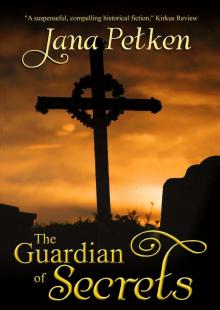 The Guardian of Secrets and Her Deathly Pact
The Guardian of Secrets and Her Deathly Pact Dark Shadows
Dark Shadows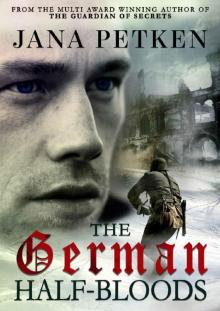 The German Half-Bloods (The Half-Bloods Trilogy Book 1)
The German Half-Bloods (The Half-Bloods Trilogy Book 1) Swearing Allegiance (The Carmody Saga Book 1)
Swearing Allegiance (The Carmody Saga Book 1)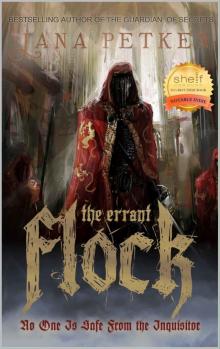 The Errant Flock
The Errant Flock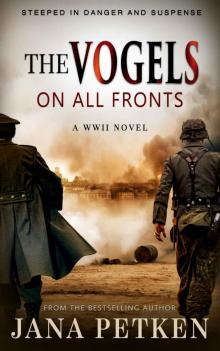 The Vogels: On All Fronts (The Half-Bloods Trilogy Book 2)
The Vogels: On All Fronts (The Half-Bloods Trilogy Book 2)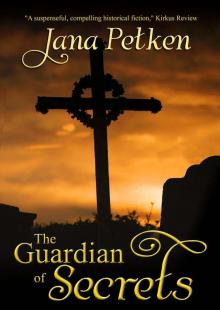 The Guardian of Secrets
The Guardian of Secrets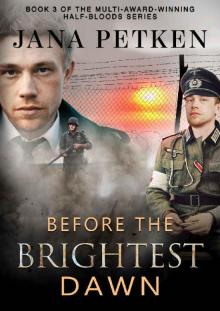 Before The Brightest Dawn (The Half-Bloods Trilogy Book 3)
Before The Brightest Dawn (The Half-Bloods Trilogy Book 3) Blood Moon (The Mercy Carver Series Book 2)
Blood Moon (The Mercy Carver Series Book 2) Dark Shadows (The Mercy Carver Series Book 1)
Dark Shadows (The Mercy Carver Series Book 1)